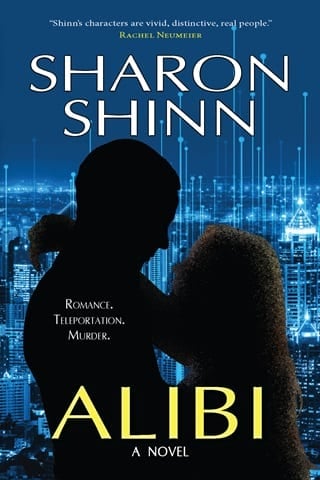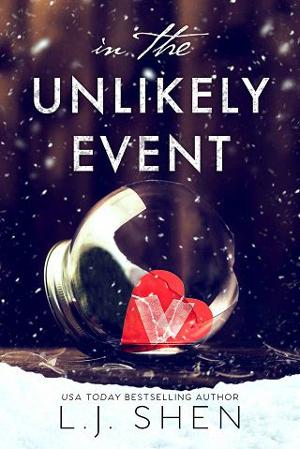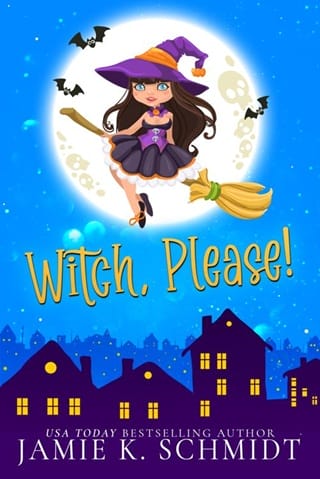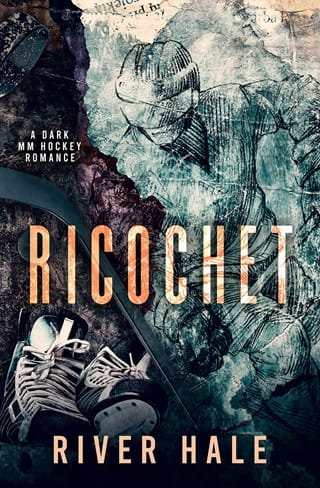CHAPTER FIFTEEN
I hadn’t figured out how I would break the news to anyone at the Phillips household that I was bringing in a new pupil, so I decided not to give any advance warning. Tuesday afternoon, Bordeaux and I teleported over to the main outer gate, one right after the other, so I could introduce her to the security guard and explain that she came in under my aegis. As I expected, he immediately dialed the main house to get permission, so when Bordeaux and I made the next short leap to the foyer, both Francis and Bram Cortez were waiting for us.
“Hi,” I said, as casual as Bordeaux herself. “I didn’t get a chance to call ahead. This is Bordeaux, a Northwestern student that I’ve been tutoring. It occurred to me that it might be beneficial for both her and Quentin if they could study together some of the time, so I thought I’d introduce them. That’s all right, isn’t it? I don’t think Quentin will mind.”
Francis was shaking the young lady’s hand and giving her his own name with his usual flawless civility. Cortez was frowning at me, but his look was speculative, not furious. It was clear that, within seconds of laying eyes on Bordeaux, he had formed a pretty accurate idea of who she was and why I had brought her. I had not seen him since the incident at Ozone, and a lot had happened since then. This was probably not the only thing he’d want to ask me about if we ever had five minutes alone together.
“We’ll need to do a security check, of course,” he said slowly. “But I imagine Quentin will be delighted to meet her.”
I turned to make formal introductions. “This is Bram Cortez, the head security officer here. You’ll see him at the most unexpected times, so watch your step whenever you’re on the premises.”
“Hey there,” she said and shook his hand. She didn’t seem too impressed. But then, she hadn’t seemed too impressed when I told her, eventually, who her true employer was. Her exact words had been, “He’s kind of a big fat prick, isn’t he? Hope I don’t run into him.”
I had had to forcibly restrain myself from switching on my EarFone and repeating this to Marika instantly.
“Hello, Bordeaux,” Cortez said gravely. “Glad to meet you.”
Cortez disappeared right after that, presumably to begin investigations into her past, but Francis led us to the elevator and down the hall to Quentin’s room. As soon as Francis had left us at the closed door, Bordeaux looked over at me with a grin.
“Well, he was sure eating you up with his eyes,” she said.
“What? Who?”
“That Bram person. You guys got a thing?”
I gave that sort of laughing gasp you can’t suppress when a verbal punch hits you right in the stomach. This outspoken young woman didn’t miss a damn thing. “You know—good question,” I said. “I’ll tell you when I figure it out myself.”
Quentin spun around from his computer as Bordeaux and I walked in. “Hey, Taylor, did you know—oh.” His mouth actually snapped shut, and he sat back in his chair. “Hello?”
I made the introductions. “Hi, Quentin,” Bordeaux said with careless charm. “Great view you have. Look at those trees.” She moved over to the window and began to play with the blinds.
Quentin was glancing between the two of us with a look I had never seen on his face before. Anxiety, that was part of it, and—I frowned a moment, trying to analyze his expression. And jealousy?
“You have other students that you tutor?” was all he said.
“One or two,” I said sort of dumbly. “I just took on Bordeaux.”
“And she’s going to be here every week? Every time you come?”
“Well, maybe not every single time. We’ll see how it goes. But I thought you might enjoy having a friend in class.”
“She’s not my friend,” he muttered.
I was shocked. I had not expected this reaction at all. Quentin loved to be around people. His happiness increased exponentially every time someone new walked into the room. Except—and of course I had not thought of this before—he had been the only non-adult and the de facto center of our collective universe. I was guessing here that he wanted all my attention, did not want to divide it with a stranger.
Perhaps I had just made a terrible mistake.
Bordeaux turned from the window at that moment, an easy smile on her face. The sunlight caught the diamonds in her cheeks, the sapphires at her eyes, the scattered glitter in her hair. “Hey, it’ll be fun,” she said with relaxed assurance. “Just wait and see.”
*
Indeed, Quentin started to melt before our first hour was over. How could he not? Bordeaux was a little ball of happy-go-lucky sunshine that just beamed warmth and contentment into the room. She settled herself on the couch and listened to our first lesson, tossing out comments when appropriate and asking questions when she missed something. When I made a quick reference to Break of Day , she interrupted right away.
“No—wait—Quentin, did you absolutely hate that book? I mean, have you ever in your life read anything so abysmally dreary?”
“I only read part of it,” he admitted. “Taylor said I didn’t have to finish it.”
“God, you are so lucky! My lit teacher made us read the whole thing and write papers, and this one girl, she started crying in class and she had to be sent away for an emotional breakdown. Because of a book. I mean, aren’t there enough other things in life to cry about?”
“I liked Josie’s Dreams, though,” he offered.
“Yeah! Superjazz, although I thought maybe a little way-too-much when the granddaughter went all loop-di-lune at the end.”
He laughed. “What else did you read for class?”
She rattled off a list of titles, most of them considered classics of the first part of the century. “And my roommate? She was skimming chapters and getting AI programs to write her papers, but I read every book. I mean, if you’re going to go to college, you may as well try to learn. Otherwise, what’s the point?”
“Did you study poetry?” He glanced at me, where I sat mute and invisible, hoping they would begin to connect. “Taylor makes me read poems. I didn’t think I’d like them, but I do.”
“Oh, yeah. I did a whole class on women poets. Sylvia Plath and Nikki Giovanni and Joy Harjo. I loved it.”
I was curious. “Did you cover any of the earlier women poets? Emily Dickinson or Elizabeth Barrett Browning, maybe?”
“We did two days on Dickinson but I don’t remember Elizabeth Barrett Browning. Is she any good?”
“Is she—okay, I know you guys were having a nice little chat, but I just can’t let that go. You sit right back and get comfortable.”
Grinning, Bordeaux wriggled back on the sofa, then opened the tiny purse she kept on a long strap over her shoulder. “Hey, Quentin, you want some gum?”
Quentin’s eyes widened with a wicked glee. If I’d had to guess, I’d say that at some point in his life, this pleasure had been forbidden to him, maybe when he was a boy and got sticky stuff smeared all over the carpet. “Sure. What flavor?”
“Oh, this’ll melt your mouth off. It’s called Chernobyl Cherry, and I. Just. Love. It.”
I waited until they had unwrapped their gum—thought to offer me some, which I declined—and seemed to be capable of paying a reasonable amount of attention again. Then I launched into lecture mode.
“Elizabeth Barrett was a well-known British lady poet of the mid-1800s. She came from a large family, lots of brothers and sisters, but she was pretty sickly. In fact, for years and years she believed that if she ever exercised or even got any fresh air, her mysterious ailments would worsen and she would die. So she basically stayed in her house, lying on a couch all day. All she did was talk to her brothers and sisters, and write letters to her millions of friends, and publish poetry.
“Robert Browning was about six years younger than she was—he was also a poet, but by the time he was in his early thirties, he hadn’t published much, and what he did publish was murky and hard to understand. Anyway, he read one of her poems and sent her this amazing letter, saying something like, ‘Miss Barrett, I love your poems with all my heart, and I love you too!’”
Bordeaux arched her eyebrows. “That’s kind of intense.”
“She thought so, too. But she wrote him back, and he wrote her again, and for the next couple of years they corresponded practically every day. He started visiting her, and they would still write letters on the days they’d visited. Their collected letters take up two whole volumes.
“Well. Of course they fell in love. Robert wanted to get married, but Elizabeth’s dad was creepy and bizarre, and he refused to allow any of his children to marry. One or two of them eloped, and he never spoke to them again. Elizabeth couldn’t bear the idea of leaving her family—plus, of course, she believed she was on the verge of dying. But the interesting thing was, Robert kept asking questions about her health, and it turned out she didn’t really have an identifiable disease—she’d just been languishing because everyone thought she was frail. So, as he encouraged her, she started taking carriage rides, and going for walks in the park, and gradually regaining some of her strength. Pretty miraculous when you think about it.”
“So what happened? Did she die?” Quentin asked.
“After a long courtship, they eventually did elope. They went to live in Italy, where the climate was much kinder to Elizabeth’s constitution, and they had a son. I believe they never spent another night apart until Elizabeth’s death fifteen years later.”
“So she did die,” Quentin said.
“Yeah, but fifteen years—not too wasted,” Bordeaux said. “I’d take fifteen years of happiness after thirty-some years of being cooped up in a house with a crazy dad.”
“I’d take it after nineteen years,” Quentin murmured. I cast him a quick worried glance, but he smiled; it had been a joke. Of sorts.
“Anyway,” I resumed. “Elizabeth wrote this long cycle of sonnets about how much she loved Robert. One of them is pretty famous. ‘How do I love thee? Let me count the ways.’”
“Oh yeah, I like that poem,” Bordeaux said. “Maybe I’d like all of them.”
“Mmm, maybe. A lot of them are rather maudlin, but some are absolutely lovely. In fact, one of my favorites is the first poem in the cycle, which starts out very dark and forlorn as she talks about her life so far and all her ‘melancholy years.’ And then she senses some great shadowy shape moving behind her, and it grabs her by the hair and pulls her backward. And the poem goes:
“And a voice said in mastery, while I strove—
‘Guess now who holds thee?’—‘Death,’ I said. But there,
The silver answer rang—‘Not Death, but Love.’”
I stopped and smiled at them. Neither seemed quite as moved as I always was by this triumphant surprise ending. “Not death, but love,” I repeated. “It’s such a hopeful concept, especially for someone who wasn’t exactly noted for her upbeat attitude.”
“It’s very nice,” Bordeaux said politely.
I grinned. “Well, hey, read all of them, or don’t read any of them, but I just wanted to share that gem with you.”
“Is that your favorite poem, Taylor?” Quentin asked.
“Oh, no. I only like Barrett Browning in bits and patches.”
“So what is your favorite poem?”
“Depends on my mood. On the top of the list is one by another Victorian lady poet.” They looked only marginally interested, but that was good enough for me, so I plunged on.
“Christina Rossetti. Now she had a lot of sorrow in her life, and spent years taking care of sick aunts and dying parents, and she wrote all these gloomy verses about how you shouldn’t plant rose bushes at her grave after she died because she wouldn’t be able to see the flowers anyway. And she fell in love with a nice guy, but they ended up not getting married because of religious differences. So. A lot of heartbreak. Anyway, she wrote this one unexpectedly exuberant poem that I’ve always loved. Especially the last two lines:
“My heart is like a singing bird
Whose nest is in a water’d shoot;
My heart is like an apple-tree
Whose boughs are bent with thick-set fruit;
My heart is like a rainbow shell
That paddles in the halcyon sea:
My heart is gladder than all these
Because my love is come to me.
Raise me a dais of silk and down;
Hang it with vair and purple dyes;
Carve it in doves and pomegranates,
And peacocks with a hundred eyes;
Work it in gold and silver grapes,
In leaves and silver fleurs-de-lys;
Because the birthday of my life
Is come, my love is come to me.”
“Yeah,” Bordeaux agreed. “Those last two lines are marbro.”
I had no idea what marbro meant, but assumed it was along the lines of jazz and strat. “You’ll notice,” I said, “that many poets reserve their best images and most beautiful words for the last two or three lines of any poem. It’s like the spire on a church. It’s what the whole structure was built for.”
“What’s vair?” Quentin asked.
I looked over at him and started laughing. “I had that very question, so I looked it up once. It’s squirrel fur. Popular in medieval times as an ornamental trim.”
“Squirrel?” Quentin repeated, wrinkling his nose. “Wouldn’t you pick fox or mink if you were going for ornamental?”
Bordeaux was grinning. “Kind of makes the poem a little less wonderful, doesn’t it?” She puffed out her cheeks in what I assumed was an attempt to look like a squirrel. Quentin fell into a helpless fit of giggles.
“Well, I still like the last two lines,” I said.
“Is class always this much fun here?” Bordeaux asked.
Quentin recovered enough to say, “Every day.”
“Then I’m coming back for sure.”
Quentin looked quickly between us. “Of course you are! Taylor said you would! We’re going to study together.”
By which I gathered that, in the course of the hour, he had overcome his jealousy and admitted her to his never-exclusive circle of friends. “She might not come every single day,” I said. “Sometimes you and I might have more intensive work to do. But I think it will be good for both of you to study together.”
Bordeaux smiled. “Suits me.”
I stood, because the hour was over, and Bordeaux bounced to her feet as well. But instead of turning toward the door, she headed for the chess set that always waited hopefully on Quentin’s computer table.
“You like chess?” she asked him.
His eyes lit. “Yeah! Bram plays with me sometimes, and Taylor says she will, but she never does. I have some online opponents, but it’s more fun in person.”
She tossed back her short hair, and her beads clicked together. “I’ll play with you.”
“Right now?”
“Sure. I don’t have to be anywhere for—” She glanced at the wristwatch strapped over the thorn tattoo. “About four more hours.” She smiled. “Now, I know some people can take a month to play a chess game, but I would think we could manage a game in four hours.”
“Stratospheric!” he exclaimed. “Bye, Taylor! See you Friday!”
I couldn’t help smiling, but as I moved toward the door, I made a final admonition to Quentin. “When Bordeaux gets ready to leave, be sure Francis or Bram is around to escort her back to the foyer. Okay? I don’t want her to get lost in the house.”
He nodded without looking at me, so intent was he on studying the board for his first move, but Bordeaux gave me a slow, considering examination. “I won’t steal anything,” she said.
I shook my head. “Trust me,” I said, “that’s not it.”
She thought about it a moment longer, then nodded; I knew I would have to tell her the truth. Nobody’s toy, this girl. And, charming and relaxed though she could be, confident about her own worth. I liked her better with every passing minute.
“See you guys in a few days,” I said and left. I didn’t think they noticed when the door closed behind me and Francis and I walked down to the foyer without her.
 Fullepub
Fullepub 



